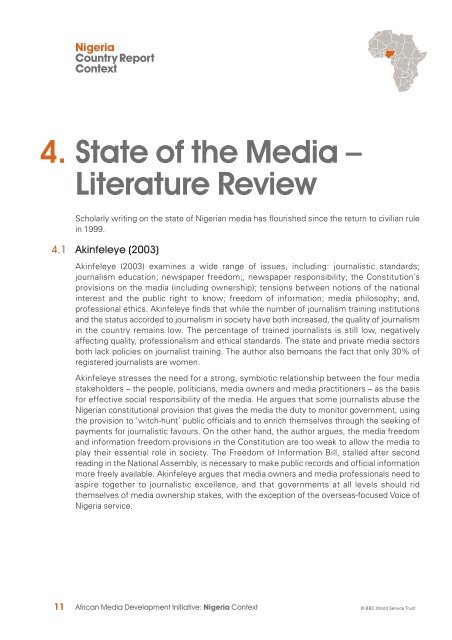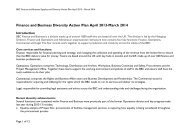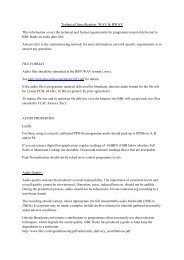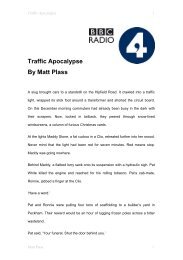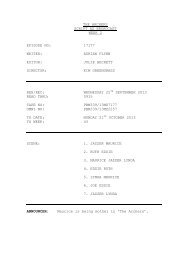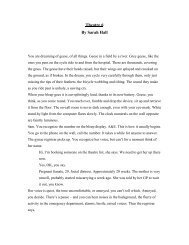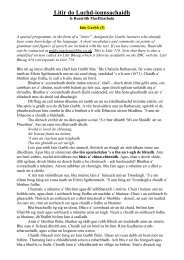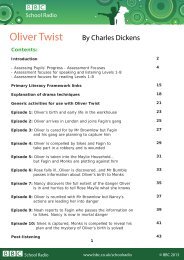Literature Review - BBC
Literature Review - BBC
Literature Review - BBC
You also want an ePaper? Increase the reach of your titles
YUMPU automatically turns print PDFs into web optimized ePapers that Google loves.
Nigeria<br />
Country Report<br />
Context<br />
4. State of the Media –<br />
<strong>Literature</strong> <strong>Review</strong><br />
Scholarly writing on the state of Nigerian media has flourished since the return to civilian rule<br />
in 1999.<br />
4.1 Akinfeleye (2003)<br />
Akinfeleye (2003) examines a wide range of issues, including: journalistic standards;<br />
journalism education; newspaper freedom;, newspaper responsibility; the Constitution’s<br />
provisions on the media (including ownership); tensions between notions of the national<br />
interest and the public right to know; freedom of information; media philosophy; and,<br />
professional ethics. Akinfeleye finds that while the number of journalism training institutions<br />
and the status accorded to journalism in society have both increased, the quality of journalism<br />
in the country remains low. The percentage of trained journalists is still low, negatively<br />
affecting quality, professionalism and ethical standards. The state and private media sectors<br />
both lack policies on journalist training. The author also bemoans the fact that only 30% of<br />
registered journalists are women.<br />
Akinfeleye stresses the need for a strong, symbiotic relationship between the four media<br />
stakeholders – the people, politicians, media owners and media practitioners – as the basis<br />
for effective social responsibility of the media. He argues that some journalists abuse the<br />
Nigerian constitutional provision that gives the media the duty to monitor government, using<br />
the provision to ‘witch-hunt’ public officials and to enrich themselves through the seeking of<br />
payments for journalistic favours. On the other hand, the author argues, the media freedom<br />
and information freedom provisions in the Constitution are too weak to allow the media to<br />
play their essential role in society. The Freedom of Information Bill, stalled after second<br />
reading in the National Assembly, is necessary to make public records and official information<br />
more freely available. Akinfeleye argues that media owners and media professionals need to<br />
aspire together to journalistic excellence, and that governments at all levels should rid<br />
themselves of media ownership stakes, with the exception of the overseas-focused Voice of<br />
Nigeria service.<br />
11 African Media Development Initiative: Nigeria Context © <strong>BBC</strong> World Service Trust
4.2 National Broadcasting Commission (2005a)<br />
The first volume (2005a) of the National Broadcasting Commission’s African Broadcast<br />
Journal looks at Nigeria’s position within the contemporary world of broadcasting.<br />
Mohammed Musa’s contribution in the report analyses the globalisation of media, arguing<br />
that the liberalisation of broadcasting tailored along the American version of advertising- and<br />
profit-driven media is not suitable for Africa and Nigeria. Church Akpan’s article considers the<br />
role broadcast media can play in the elimination of child labour in Nigeria. Karita Ngbale’s<br />
paper focuses on the role of IT in national planning, looking in particular at IT use in relation to<br />
the centralisation of statistical information in the National Documentation and Information<br />
Centre. Ngbale describes the lack of availability of necessary human resources and tools to<br />
manage information collation, and also the lack of awareness of, and access to, official<br />
statistical information.<br />
The fourth paper, by Gerard Amengerrigyor, discusses the status of web-casting as beyond<br />
the purview of national regulation, a vexed issue for many governments in Africa that are<br />
interested in controlling media content. Enumerating the many advantages of web-casting,<br />
the paper argues that national governments should not be given the opportunity to control<br />
web-casting in the same way they have controlled traditional media. The final paper, by<br />
Mustapha Nasir Mallam, focuses on the need for a more developmental philosophy of news<br />
among Nigerian journalists, based on a survey of journalists and content analysis of six<br />
selected Nigerian newspapers.<br />
4.3 Nigerian Communications Commission (NCC) (2004a)<br />
The 2004 Annual Report of the Nigerian Communications Commission (NCC), the<br />
telecommunications regulator, provides a useful outline of the Commission’s dual mandate to<br />
support market-driven growth in the telecommunications industry while at the same time<br />
promoting universal access. To these ends, the Commission promotes market liberalisation,<br />
sets and monitors standards, enforces operator licence conditions, protects new entrants<br />
from dominant operators, encourages deployment of new advanced services and aims to<br />
maintain transparent regulatory processes and protects consumer rights and interests. The<br />
NCC report also outlines key recent events in the telecommunications sector, including the<br />
commissioning of the Digital Bridge Institute (DBI) training centre; the ban on the importation<br />
of cellular telephony re-charge cards; and, the approval of 731 applications for licensing of<br />
various communications services.<br />
4.4 Akinfeleye & Okoye (Eds.) (2003)<br />
This volume covers a century of Nigerian media history from 1900 to 2000. The chapter by<br />
Olubunmi Ajibade looks at the contributions of religious publications to the development of<br />
Nigerian journalism, acknowledging the pioneering role of missionaries in the establishment<br />
of modern media. The author argues that in a morally compromised society such as Nigeria’s,<br />
religious instruction via the media is still needed.<br />
The chapter by Akinfeleye provides reflections on Nigerian television’s historical, sociological and<br />
philosophical evolution, arguing that effective use of television for development is a pre-condition<br />
for sustainable democracy and development. Ogu Sunday Enemaku’s chapter covers the<br />
deregulation of the Nigerian broadcast industry and the ensuing challenges and opportunities,<br />
arguing that deregulation became necessary because the previously state-controlled<br />
dispensation could no longer satisfy the media and information needs of the people.<br />
12 African Media Development Initiative: Nigeria Context © <strong>BBC</strong> World Service Trust
Okoye’s chapter provides an historical overview and analysis of government-media relations<br />
since 1900, arguing that the relationship between the government and the mass media is of<br />
utmost importance in any society. He tasks the government with creating an enabling<br />
environment for the media by removing debilitating legislation and ceasing the exercise of<br />
arbitrary government power. The chapter by Ifedayo Daramola examines the weakness of<br />
Nigeria’s constitutional protection of media freedom, and the absence of a specific legal<br />
instrument for media freedom.<br />
4.5 Soola (Ed.) (2002)<br />
This volume of scholarly papers probes the history of development communication and is of<br />
particular interest for its indigenous perspective and focus on the local needs of<br />
development. Many scholars have devoted their time to criticising the theoretical<br />
postulations of Western thought, such as modernisation theory, and the way development is<br />
defined by the development agencies. This volume’s development communication angle<br />
posits that to be effective in communicating for development, “our media choice must be<br />
predicated on a sound knowledge base of what is needed, what each available medium can<br />
do, what combination of media is complementary, how much it costs to deliver messages<br />
through the media, and what the culture and characteristics are of those we are trying to<br />
reach” (p.22).<br />
The book sees radio as particularly relevant to the needs of the rural, marginalised and<br />
disadvantaged poor, recommending that the use of radio should be “community-specific and<br />
situation-relevant; it must be dialogic and participatory, rather than being hierarchical and topdown”<br />
(p.24).<br />
The book also examines the importance of the Internet and recommends that for Nigerian<br />
communities to reap the full benefits of the Internet, rural radio stations must be connected to<br />
it, so as to gain from the pool of global knowledge. In terms of television, the book concludes<br />
that its use for development must be based on programming and content that show respect<br />
and concern for the viewer. Meanwhile, the book gives newspapers the job of sensitising<br />
policy-makers to developmental needs. The book favours development of community-based<br />
newspapers, owned partially or fully by local people and writing in local languages to promote<br />
their interests. Finally, the book recommends a synergy between mass and small-scale media<br />
as a way of guaranteeing effective communication in the development process.<br />
4.6 Bibliography<br />
Akinfeleye, R. (2003) Fourth estate of the realm or fourth estate of the wreck? Imperative of<br />
social responsibility of the press. Lagos: University of Lagos Press<br />
Akinfeleye, R., & Okoye, I. (Eds.) (2003) Issues in Nigerian media history: 1900–2000 AD.<br />
Lagos: Malthouse Press<br />
National Broadcasting Commission (NBC) (2005a) African Broadcast Journal, Vol.1 (1). Abuja:<br />
NBC<br />
Nigerian Communications Commission (NCC) (2004a) Annual report. Abuja: NCC<br />
Soola, E.O. (Ed.) (2002) Communicating for development purposes. Ibadan: Kraft Books<br />
13 African Media Development Initiative: Nigeria Context © <strong>BBC</strong> World Service Trust
Key findings<br />
Training needs to be increased to address the dearth of quality, and to promote ethical<br />
journalism.<br />
The Freedom of Information Bill needs to become law.<br />
The American profit-driven model of media is not serving Nigeria’s needs.<br />
A developmental philosophy is needed among journalists.<br />
State interference in media activity must come to an end in order for the media to play<br />
their full democratic and developmental roles.<br />
Community-based radios with Internet connectivity could play an important role in<br />
democratic development.<br />
Television output must respect the needs of the viewer in order to fulfil its potential.<br />
14 African Media Development Initiative: Nigeria Context © <strong>BBC</strong> World Service Trust


